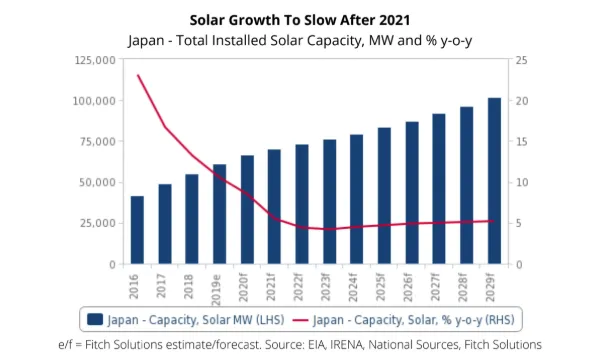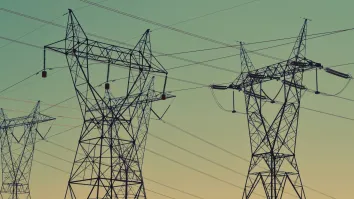
Japan struggles in transition to competitive auctions
Bids for the fifth solar auction reached 185.6MW even with a 416MW size.
Japan’s recent group of competitive auctions have underperformed, potentially slowing down its solar expansion and transition away from feed-in tariffs (FiT).
Japan’s Ministry of Economy, Trade and Industry (METI) announced the results from the country's fifth solar auction and only 39.8MW was allocated after receiving bids worth a combined 185.6MW. This is despite a 416MW auction size (including the additional capacity that was not awarded under the fourth auction carried over into this round).
According to a note by Fitch Solutions, the prices registered in Japan's first five solar capacity auctions also mean that Japanese solar capacity remains very uncompetitive on the international stage, a point cemented by the failure of the second auction and the high prices registered in the third auction.
SOLAR AUCTIONS HAVE UNDERPERFORMED
(Source: Ministry of Economy, Trade and Industry, Fitch Solutions)
| Auction | Date | Lowest Accepted Bid (JPY/kWh) | Average Accepted Bid (JPY/kWh) | Allocated Capacity (MW) | Capacity Target (MW) |
| First | Nov 2017 | 17.2 | 19.6 | 141 | 500 |
| Second | Sep 2018 | 16.47 | - | 0 | 250 |
| Third | Dec 2018 | 14.25 | 15.01 | 196.9 | 300 |
| Fourth | Sep 2019 | 10.5 | 12.98 | 195.8 | 300 |
| Fifth | Jan 2020 | 10.99 | 12.57 | 39.8 | 416 |
“Whilst the fourth and fifth auction registered some improvements in cost, we stress that Japan has yet to see the same type of cost reductions elsewhere in the region, and costs remain much higher than regional peers. As such, Japan has struggled to manage the transition to an auctions system, with less capacity than expected having been awarded and cost deflation having been limited,” the firm wrote.
Fitch Solutions attributed the underperformance of the auctions to some key challenges facing large-scale solar projects. The awarded projects in this round’s solar auctions only ranged from 0.792MW-2MW, with an evident lack of any large-scale solar projects, which could have contributed to the significant drop in this round’s capacity allocation. “This is in line with our expectation that smaller facilities, notably distributed in nature, will dominate Japan's renewables expansion over the coming decade,” it added.
Larger projects have to overcome limitations to grid capacity availability and difficulties in acquiring land in suitable locations. An elevated bid price can also be attributed to significant security deposit requirements and generally high labour costs.
The METI signalled intentions to abolish the country's FiT programme, and to revise a related law in FY2020 to adopt a competitive bidding system for large-scale electricity generation. “The ministry is likely to undergo in-depth discussions of an overhaul of their FiT system over the coming months. As such, whilst a backlog of FiT projects will sustain robust solar capacity growth rates over the next two years until it has run its course, we expect growth to slow from 2021 onward. We forecast solar capacity to grow at an annual average of 4.8% between 2021 and 2029, to reach over 100GW by 2029, a significant reduction from historic double digit growth rates over the past decade,” Fitch Solutions commented.
Whilst the progress of utility-scale projects are stuck in the doldrums, continued solar growth in Japan will remain supported by distributed solar capacity development as households and industry look to boost self-generation in order to reduce their reliance on retail electricity.
In line with increasing retail electricity prices, residential and commercial & industrial (C&I) consumers could also look to deploy their own solar capacity, and shift towards self-consumption and to supply surplus generation back into the grid. Small-scale projects under 250kW will also have continued access to Japan's FiT scheme in FY2020, based on the latest FiT proposals announced in January 2020.
“That said, we note that with effect from FY2020, electricity generated at any low-voltage commercial solar plant (10kW-50kW) will require a stand-alone operation function, which could result in a slight increase in operational costs, although this is likely to be less than the cost savings achieved from self-consumption,” Fitch Solutions said.
Given Japan's vulnerability to natural disasters, distributed generation can also help consumers ensure greater energy security in scenarios where grid access is temporarily unavailable. Additionally, the Ministry of Environment is planning to create a financial aid programme that will assist in independent community-based systems incorporating renewable energy, storage systems, and transmission grids.



















 Advertise
Advertise





